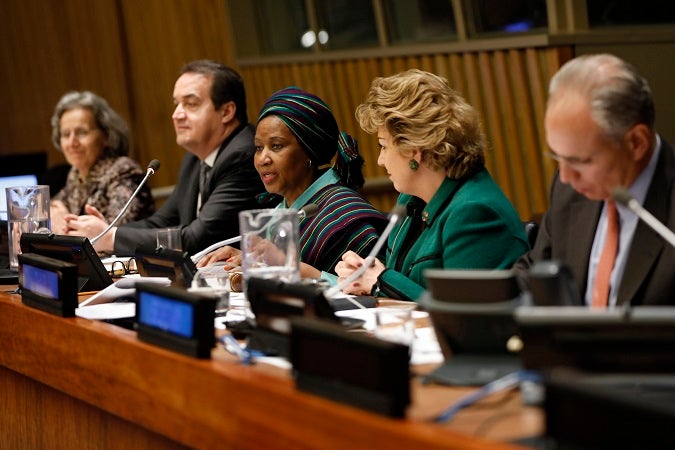Closing remarks to the 62nd session of the UN Commission on the Status of Women by United Nations Under-Secretary-General and Executive Director of UN Women, Phumzile Mlambo-Ngcuka
Date:

[As delivered]
Madam Chair, I wish to thank you, together with your Bureau, especially your Vice Chair, and our excellent Facilitator, who managed not only to run this Commission efficiently, but who managed to make it feel warm. It didn’t feel as if we were disagreeing but made it a pleasure to debate and come to difficult conclusions. This is truly highly appreciated, I am sure by rural women, as well as by those sitting in the gallery who have been accompanying us.
I thank the delegates for their hard work and long nights in the last few days. Thank you to the UN Women staff who supported this Commission as always, and of course, Madam Chair, thank you for your excellent leadership, where your attention to detail was much appreciated.
Above all, I want to thank the rural women, some coming through civil society, and some represented in your delegations, who participated both directly and indirectly, influencing and supporting the arrival at conclusions that will make their lives better. Women and girls in rural areas wish always to be there when decisions are being made or considered about their lives, and above all they wish to contribute by making sure that they will participate in implementing whatever is agreed upon.
I want to thank you for the resolutions that were adopted this evening and for the agreed conclusions, which go far in enabling us to address the very special situation that is faced by women and girls in rural areas.
These agreed conclusions focus on addressing the poverty of women and girls in rural areas; the important issue of access, ownership and control of land and other productive resources; opportunities and challenges in agriculture, including their food security and nutrition; and they also recognize that the lives of women in rural areas are not only confined to food production and agriculture. They address the impact of climate change, and the need for infrastructure such as for ICT, energy, transport, drinking water and sanitation.
They importantly address education, from childhood education to tertiary education, including vocational training and lifelong learning. This is both a right and a tool to enhance their varied roles in the economy and in public life.
They address unpaid care and domestic work and ensure that we prioritize the recognition of the need to reduce and redistribute women’s work and to recognize unpaid work in our economies.
They address social protection policies, and access to affordable and quality social services, including child-care services, maternity, paternity or parental leave.
They recognize multiple and intersecting forms of discrimination, and the protection, rights and needs of indigenous women, women with disabilities, women of African descent, older women, as well as young women and girls in rural areas.
They require us to ensure that we use the resources and partnerships that we have to respond to the needs identified.
They also raise the importance of laws that end all forms of discrimination against women and girls in rural areas and the norms that underlie them.
They capture the fact that this is a tipping point. In the last few weeks we have discussed the notion that it is time to end all forms of gender inequality.
The youth here, in particular, captured the urgency of the moment. In their own deliberations they have asked us to highlight the fact that they believe in, and are committed to, taking an active role in their destiny. They highlighted the importance of being present and participating fully, as the women in rural areas also highlighted, where there are issues that impact on their lives and that are being deliberated.
They have asked that we continue to have them in our delegations, thanked those delegations that did involve young women in the future they are discussing and urged those who did not, to do so. They told me that I will not be around to enjoy that future, so I should make sure that they are there to represent themselves.
They made very strong points about the need for access to education, such as stigma-free comprehensive sexuality education, access to affordable digital connections and technology, and safe online interactions.
Young women committed themselves to protect the environment, to climate justice and to full participation in the political lives of their countries. They emphasized the importance of working in an intergenerational context so that they can learn from those who have been around for much longer, and so that they can contribute to advising us and giving us direction for the future.
In conclusion, as we work to ensure that we leave no one behind, the theme that we have discussed this year is probably one of the most important because women who live in rural areas are at higher risk of being left behind. Our ability to address the needs of women and girls who are living in rural areas is the biggest contribution we can make to ensure the Sustainable Development Goals are achieved in the best possible way for the majority of humanity.
Thank you.